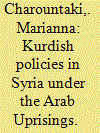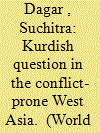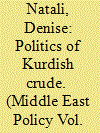|
|
|
Sort Order |
|
|
|
Items / Page
|
|
|
|
|
|
|
| Srl | Item |
| 1 |
ID:
159226


|
|
|
|
|
| Summary/Abstract |
The Middle East is frequently looked upon from an angle of tribalism.1
1 Philip Carl Salzman, ‘The Middle East's Tribal DNA’, Middle East Quarterly, 15(1) (2008), pp. 23–33; Philip Carl Salzman, ‘Tribes Today: In Anthropology and in the World’, The Journal of the Middle East and Africa, 6(3–4) (2015), pp. 353–365.
View all notes
This is specifically true for Kurdistan,2
2 In this paper, we use Kurdistan to denote the area where Kurdish people live across the four countries Iran, Iraq, Syria and Turkey. We use southern Kurdistan referring to the Kurdish Regional Government (KRG), and Iraqi Kurdistan to refer to the northern part of Iraq, governed by the KRG.
View all notes
with Kurdish people often regarded as the quintessential tribal society.3
3 Fredrik Barth, Principles of Social Organization in Southern Kurdistan (Oslo: Brødrene Jørgensen boktr, 1953).
View all notes
While the concept of tribalism has been considered by a large number of social scientists, and in particular anthropologists, it has remained ambiguous especially in relation to similar concepts such as ethnic groups or nation. While we agree on the importance of tribal affiliation as one of the components of social identity and social organization in the Middle East,
|
|
|
|
|
|
|
|
|
|
|
|
|
|
|
|
| 2 |
ID:
137738


|
|
|
|
|
| Summary/Abstract |
The effect of the Arab Uprisings on the interplay of state and non-state entities is revealed as influencing the emergence of multiple players of non-state status pursuing democratic rights, and as attempting to dismiss regional despotism as an intrinsic element of ongoing transition in the Middle East. This article focuses on the positive overall effect on the Kurdish movement of unity and cooperation between KRG and PKK-PYD actors to achieve Kurdish harmony, and as interconnected paradigms vis-à-vis their influence and interaction with regional players. Given the rise of the Kurds in Syria and the KRG’s regional importance as the first actual Kurdish de facto state entity, the PKK’s role appears key for unifying and institutionalising the relatedness of the Kurdish movements in Iraq and Syria. An empirical understanding of the Kurdish case, explained through a conceptual model of ‘multi-dimensional interrelations’, may further clarify how the theoretical framework can be applied to International Relations
|
|
|
|
|
|
|
|
|
|
|
|
|
|
|
|
| 3 |
ID:
139360


|
|
|
|
|
| Summary/Abstract |
No other region in the world has seen as much violence, physical destruction and civilian casualties, internal displacement of population, militarization of society and enduring psycho-social trauma in the past decade as West Asia. With the increase in the number as well as intensity of armed conflicts in the region since the US-led invasion of Iraq in March 2003, West Asia remains the locus classicus of recurrent warfare.
|
|
|
|
|
|
|
|
|
|
|
|
|
|
|
|
| 4 |
ID:
112119


|
|
|
| 5 |
ID:
172113


|
|
|
|
|
| Summary/Abstract |
For decades, Turkish policymakers have perceived the possible emergence of a Kurdish autonomous region or an independent Kurdish state in northern Iraq as an existential threat to Turkey. However, from 2008 onwards, under the Justice and Development Party government, Turkish foreign policy towards the Iraqi Kurdistan Regional Government (KRG) was gradually desecuritized. In light of Turkey’s experience, this paper explores the role of context in desecuritizing foreign policy issues in general and Turkish foreign policy towards the KRG in particular. It argues that the changing civil–military relations in Turkey as well as the country’s broader political and economic conjuncture allowed for the desecuritization of Turkey-KRG relations from 2008 onwards. The context also determined what kind of a desecuritization Turkey experienced towards the KRG.
|
|
|
|
|
|
|
|
|
|
|
|
|
|
|
|
| 6 |
ID:
163642


|
|
|
|
|
| Summary/Abstract |
Turkey’s response to the Kurdistan Regional Government of Iraq’s independence referendum took most observers by surprise. The prevailing assumption was that, despite its vocal objections, Turkey would eventually just accommodate the results of the referendum because years of engagement and a KRG-centred Iraq policy had created multi-faceted interdependencies, which would be hard to overturn. However, rhetoric dictated policy. In a counter-intuitive move, Turkey realigned its partnerships to chart a new policy which involved greater coordination with the central government of Iraq. This reaction is best understood through a study of contextual variables at regional, domestic and leadership levels which have led to major changes in Turkey’s regional policies.
|
|
|
|
|
|
|
|
|
|
|
|
|
|
|
|
|
|
|
|
|